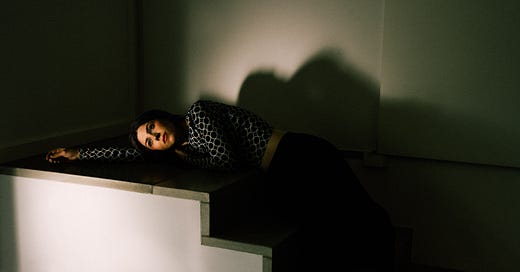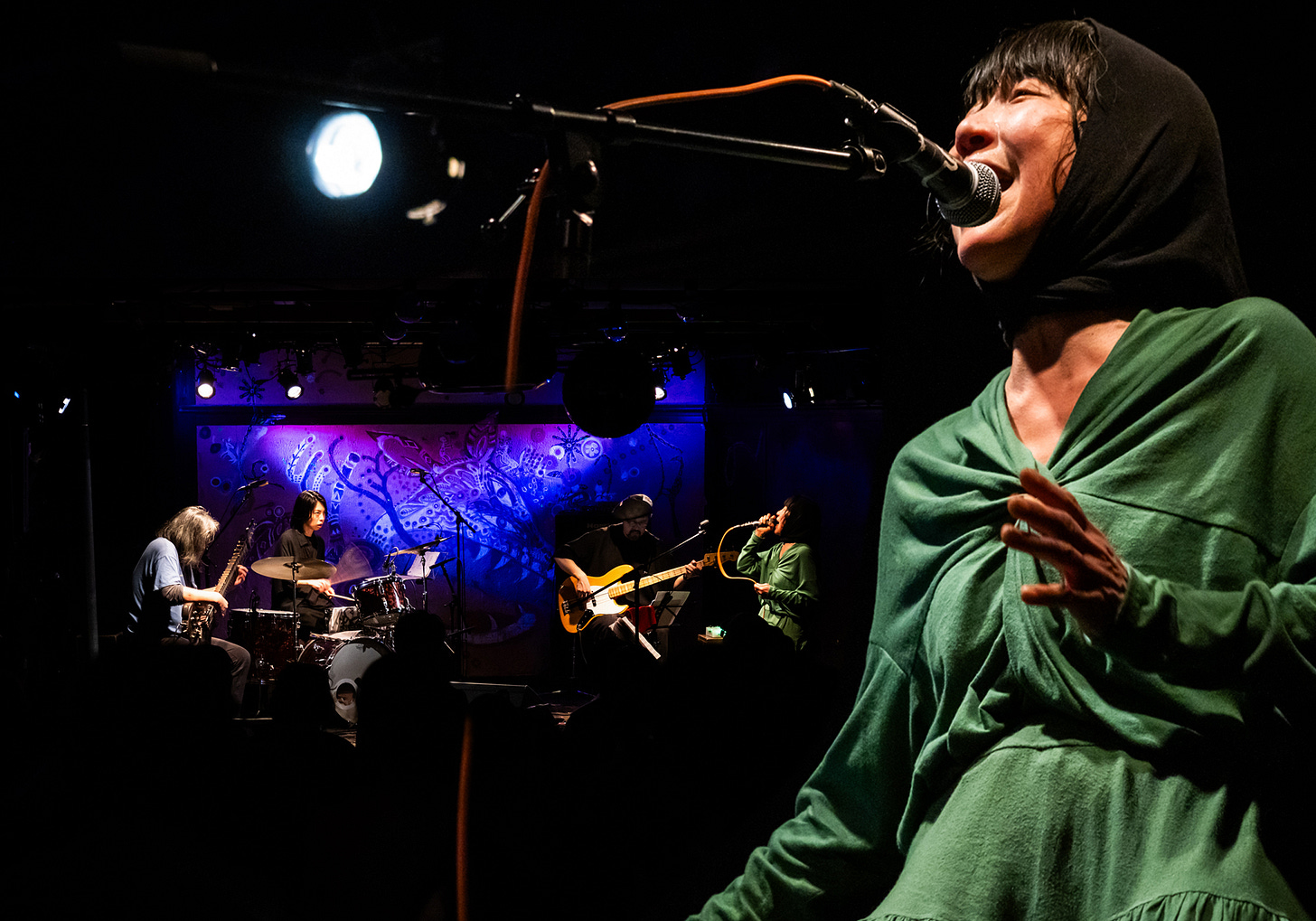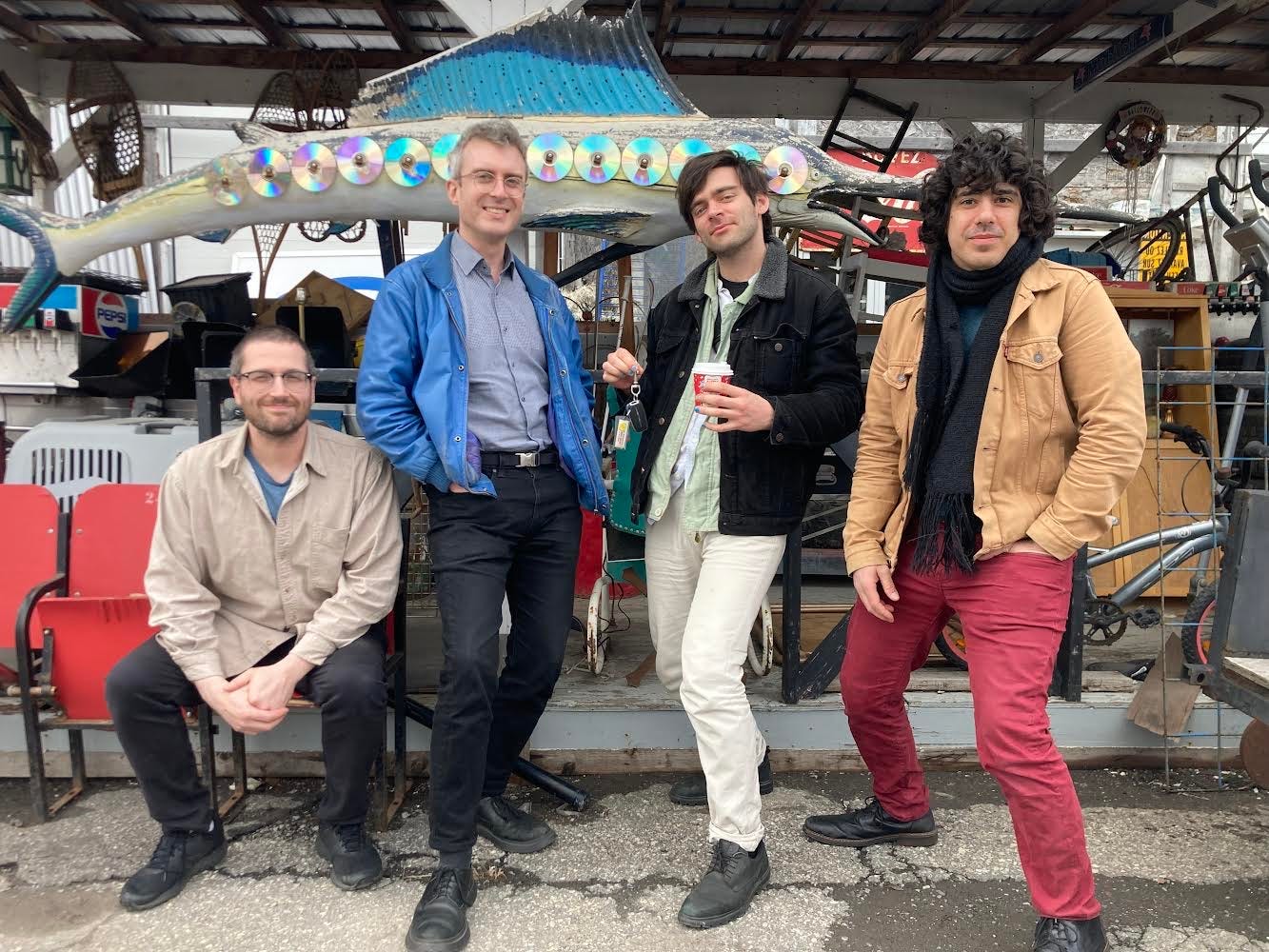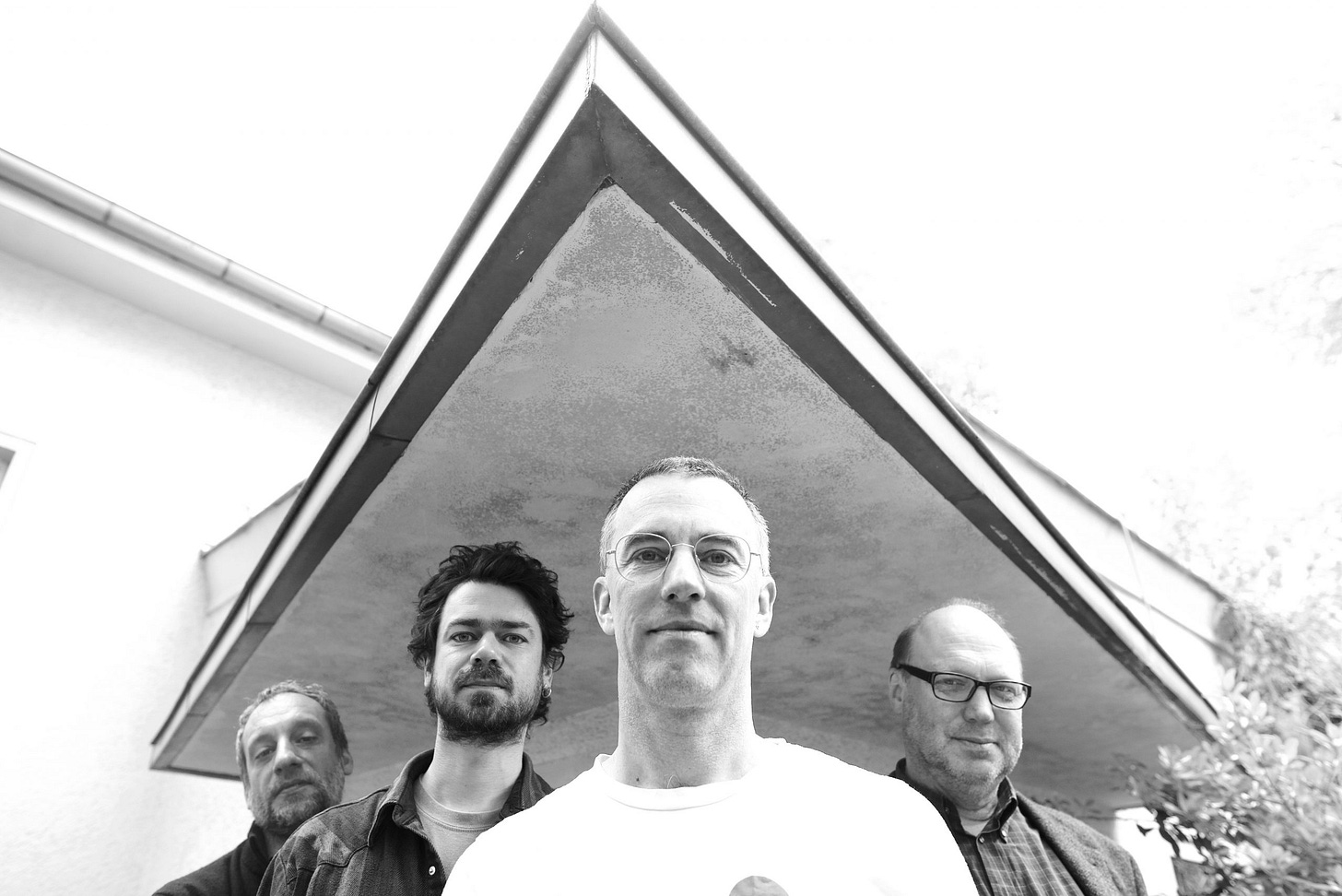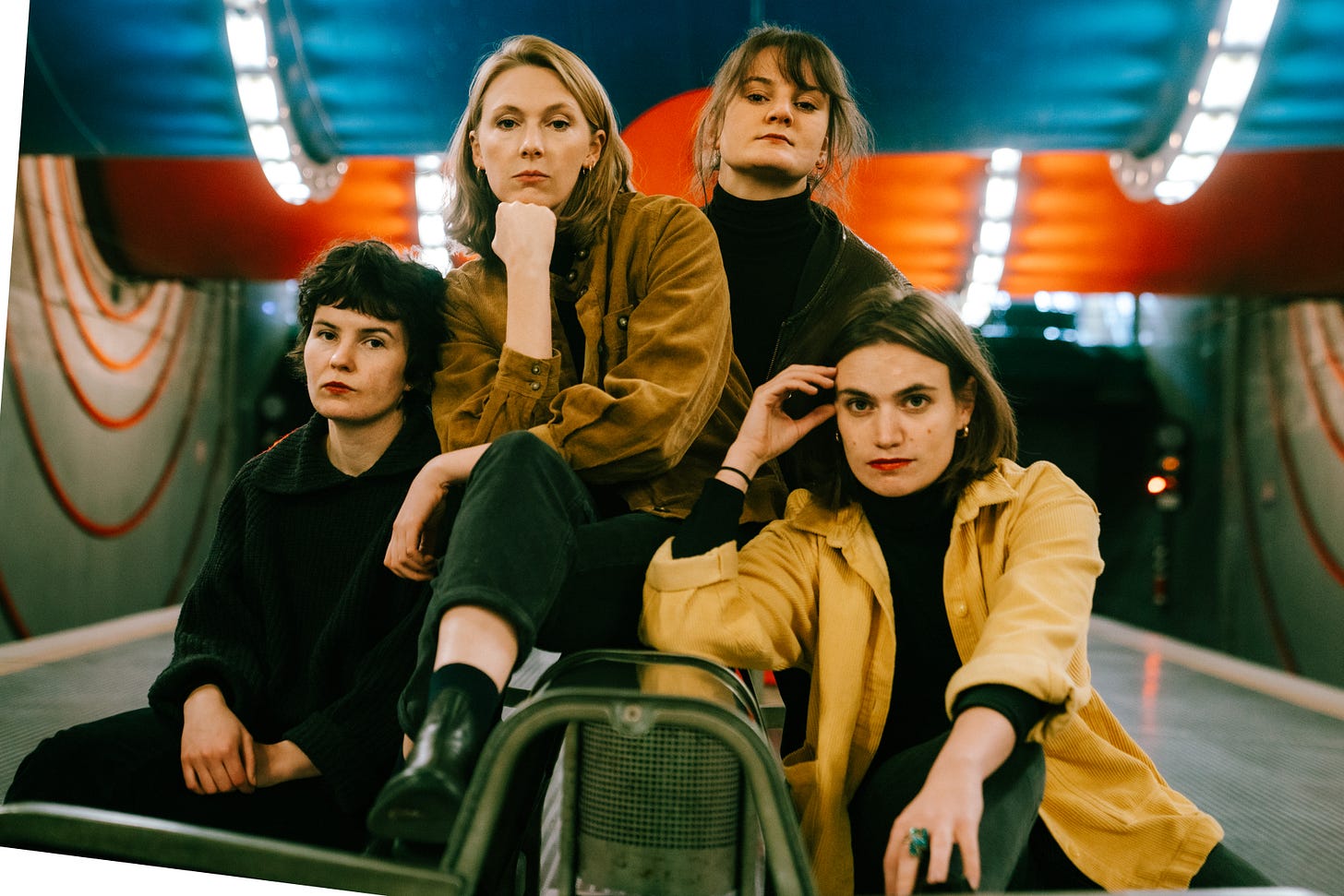Horns of Plenty
Julia Holter, Saicobab, Horse Lords, Jonas Cambien's Maca Conu, Christian Marien Quartett, Weston Olencki Laura Cocks, Hilde, Khaled
Welcome back. Thanks again to those who’ve pledged financial support to Nowhere Street. As I mentioned in last week’s newsletter I’ve made it possible to subscribe to the newsletter and I hope you all realize how much your contributions are appreciated. As this week’s very long post makes clear—so long that the whole newsletter might not fit into this email depending on your program—I put a fair amount of time into this endeavor.
Lost in the Depths of Julia Holter’s Sonic Universe
Julia Holter has described her music as meandering. I couldn’t agree more. Normally I use that term as a pejorative, but with Holter it reflects an exploratory quality. Last month she released Something in the Room She Moves (Domino), her first new album in six years, and like its predecessors it imaginatively collides different sound worlds in a way that makes demands on the listeners. There’s a strong pop sensibility embedded in her songs, which ripple with gorgeous melodies, but they’re not constructed as pop songs at all. The album’s opening tune “Sun Girl,” for example, embraces a kind of instinctual sing-songy quality that seems inspired by Holter’s role as a mother; the piece feels like a lullaby as performed by Animal Collective, but at a certain point the alternately ethereal and lumpy tune veers into a meditative passage helmed by Dev Hoff’s fretless bass and bamboo flute improvisations by Sonjia Denise Hubert Harper, which trail off into silence, before the piece goes back to the top. That meandering quality carries more weight because it happens within incredibly dense arrangements, and while the music on the new album doesn’t feel as rich or aggressive as Aviary from 2018, I’m still unpacking its mysteries.
Indeed, the new record feels more subdued than its predecessor, which makes sense considering the pandemic and Holter’s new status as a parent. In a recent interview with Tone Glow she explains a breakthrough when she finally could sing the songs she had written for the record at home in a studio space, where she could really open up her voice.
Once I got into this studio space, I recorded the vocals and it was incredible. This was a change for me. All the words that I had been trying to come up with for two years suddenly came out. It was a learning experience about knowing what you need to do for yourself. There are these ergonomic considerations that you have to think about, and you have to make sure you have a space for yourself where you can have all these things come out. I had spent two years mulling over what was going on in these songs, but I couldn’t fully go there until this moment.
I’m writing about the record this week because Holter is performing at the Colosseum in Berlin on Friday, April 12. Sadly, I’m out of town and the show is already sold out. If I had my druthers I’d like to listen to the album another dozen or more times to get a better handle on it, but that desire speaks to the music’s mystery and complexity. Most of the songs revolve around pop-like themes, but there are other stunning outliers that convey Holter’s larger artistic interests. One of my favorite pieces is “Meyou,” an almost psychedelic vocal meditation where Holter is joined by Mia Doi Todd, Jessika Kenney, Ramona Gonzalez, and Maia—a former partner of the late Phil Cohran was a key part of Chicago’s AACM during the 90s, when she was a member of Samana with Nicole Mitchell—chanting the titular phrase in decidedly loose articulation, which makes it all the more profound. It kind of reminds me of “Sing With Me,” the striking 2023 vocal piece by Slovakian singer Adela Mede, who overdubbed all of the voices, but Holter’s song feels more visceral and raw in the best way, celebrating the variety of voices and perspectives. There’s also a gripping instrumental piece called “Ocean,” on which a searching Nord exploration if overdubbed with additional synth patterns and richly nuanced improvisations from Hoff and the brilliant Chris Speed, who uncorks some truly stunning clarinet hypnosis. Below you can hear “Spinning,” one of the album’s most beautiful pieces. Check back into the space at the end of the year, when I’ve had enough time with the album.
Inhabiting the Peculiar Logic of YoshimiO’s Saicobab
For years I was amazed by the feverish creativity of YoshimiO, the crucial rhythmic center and creative foil to Yamantaka Eye in the Boredoms. She is a musician who has been no less prolific and even more original in the projects that she’s led since that group operated outside of rare performances. I was inspired by someone who could just remake their primary working band, OOIOO, each time they made a new recording, while also forming several subsequent projects and collaborations that twisted in completely different directions. When I first heard Saicobab nearly seven years ago it became clear that one of YoshimiO’s greatest talents feels like an inherent part of who she is: inventing new worlds. Saicobab stood out from the start for making the deeply instinctual playing of Daikiti (aka Yoshida Daikichi) the key ingredient of its sound. He has forged his own weird take on the sitar and Indian classical tradition, building his own customized instrument and constructing an equally unique sound world that feels sui generis in this context, right up against YoshimiO’s invented hybrid language of interjections and swoops. I can’t say for sure if she’s singing actual Japanese words or if it’s all made-up, but for a non-speaker like me it makes little difference.
The group recently released its second album NRTYA (Thrill Jockey)—the title is Sanskrit for “dance”—and as usual the music invents its own grammar, rhythmically and harmonically. The lightning-fast sitar riffs operate in unison with the leader’s wordless yammering on the opening piece “Nrtyaman,” and if you haven’t heard Saicobab before that sound alone will provoke some kind of reaction. Then the thick bass lines of Akita Goldman and the multi-limbed thump of percussionist Motoyuki “Hama” Hamamoto kick in, giving shape to the piece and also increasing its drive and heft. The latter has expanded his arsenal well beyond the Arabic riq, a frame drum, he stuck to mostly on the debut, and guest Taketawa Yo2ro added some of his beats here and there. The sound is admittedly dizzying—the new record is more intense and manic than the band’s debut Sab Se Purani Bab. I’ve spent multiple listens trying to get my head around the music, but eventually it snapped into place that it’s much more rewarding to follow YoshimiO, letting her define the logic and procedures even if they remain a bit convoluted. But letting myself sink into the music allowed me to hear subtle little details, whether it’s her own overdubbed vocals quietly seeping from the din like earthworms, or hearing a male voice offering countermelodies that more directly reflect Indian classical traditions, but only slightly.
Over time it began to fall into place, and then I started noticing a rigor and craftsmanship that’s undeniable. “Nachin Machine,” which you can hear below, zips through several modes, with Daikiti alternating between hydroplaning strummed figures and violently snaking single note runs, while YoshimiO chants and hectors her way with an organic playfulness that feels child-like in its ease. But none of this is easy—and there is still nothing I’ve heard quite like it.
The Ever Sharpening Attack of Horse Lords
The Common Task (Northern Spy) was the album where Horse Lords fully made sense to me, bringing together various threads and ideas into a single visceral package where psychoacoustic experimentation, Mauritanian trance, and art-rock transcended that seemingly hodge-podge list of ingredients. Unfortunately, the record dropped on March 13, 2020, just as the pandemic was putting our lives into a deep-freeze. Later that year most of the Baltimore-based quartet relocated to Germany, with guitarist Owen Gardner and bassist Max Eilbacher both settling in Berlin. As the pandemic eased a bit the group began touring all over Europe. I got to hear a powerful set by them at the Moers Festival in 2021 that only reinforced my admiration. Last year the group dropped Comradely Objects (RVNG), which captured the band’s increased intensity and focus. Still, as great as the highs were, there were some dead spots that could suck away the accrued energy in a way that the group’s live show most certainly did not.
Since then the band has released two live recordings. Last year’s Live in Leipzig was a sonic amuse bouche, and with only four tunes it felt like something to attract press attention during the band’s heavy touring schedule. Last month the group dropped a proper live album, As it Happened: Horse Lords Live, which captures the quartet’s essence like nothing before. The music is drawn from across the group’s history, including a significantly jacked and improved reading of “Macaw,” which originally appeared on the band’s 2014 album Hidden Cities. The recording reflects how the band has developed into a fearsome live juggernaut, where Eilbacher’s lacerating bass lines swing with wrecking ball force, held in place by the taut motorik drumming of Sam Haberman. (Due to geographic distance, a lot of the European shows have featured a variety of hired hands on drums, all quite impressive, and this current run of shows will feature Colin Hacklander on the drum throne).
I’m still puzzled how things all fit together, but I’m fairly convinced that the band’s binding agent is Andrew Bernstein, who plays saxophone and extra percussion. Or maybe it’s the electronic Eilbacher commands while he’s unspooling ferocious bass lines. Gardner’s mastery of North African microtonality is no less dazzling or authoritative, but he also contributes splotches of grainy noise, bad-ass, tightly coiled hard rock riffery, and minimalist rhythmic effects. Below you can listen to the live version of “May Brigade,” a psychedelically jagged and funk jam originally featured on Comradely Objects. As impressive as Horse Lords were at Moers, where they played outdoors at the foot of a huge hill, I’m super excited to hear the group within the cozy confines of Kantine am Berghain on Tuesday, April 9, where the crush of sound won’t dissipate into the air so readily. The show marks the season opener for Marie Blobel’s Jazzexzess series, which presents its second concert just a few days later when Amirtha Kidambi’s Elder Ones perform at House of Music on Saturday. This week’s newsletter is already way too long, so I’ll include this link to my review of the band’s new We Jazz album New Monuments from the Quietus.
Jonas Cambien Explores Cracks in Overlooked Stylistic Boundaries With Maca Canu
Jonas Cambien, a Belgian keyboardist based in Oslo, Norway, has been on my radar for quite a while thanks to a series of strong albums for Clean Feed, but over the last year I’ve noticed that he’s broken out of his usual post-bop confines. It’s likely that Cambien always had a more catholic sensibility, but it’s become more palpable starting with his contributions to last year’s excellent On the Blink (Aerophonic), a collaborative improvised recording with Chicago reedist Dave Rempis and Belgian electric bassist Farida Amadou. His imaginative playing has captured my attention. At the end of May Sublime Frequencies will release the stunning eponymous debut from a trio he plays in called the Handover, featuring two stellar Egyptian musicians: oud player Aly Eissa and violinist Ayman Asfour. That extended work finds Cambien thriving within a microtonal sound world rooted in Arabic modes, using his keyboard to create an agile foundation for extended improvisation. The trio is playing some European shows this summer, including a performance at the 2024 edition of the Motvind Festival in Rollag, Norway.
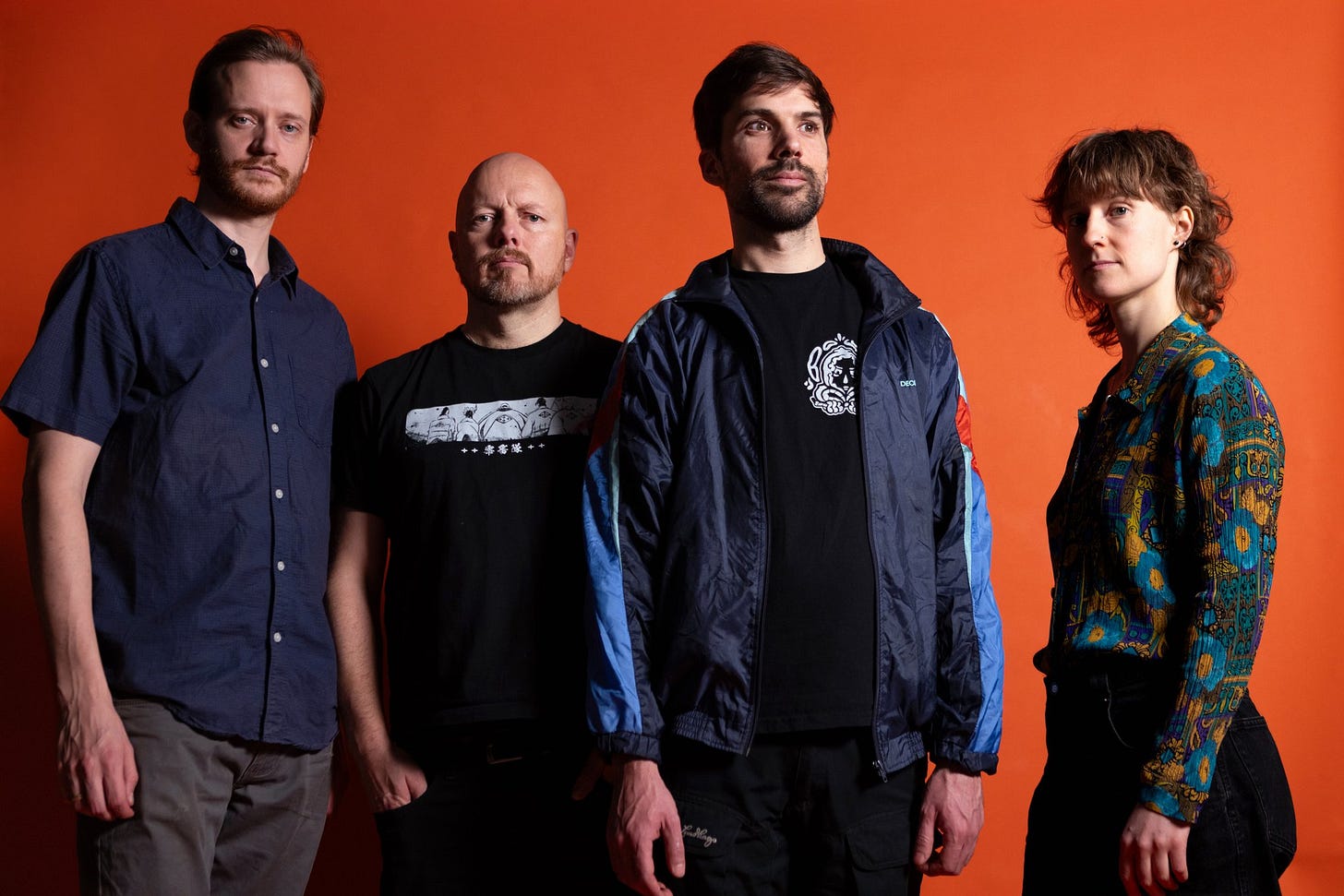
Earlier this year Cambien released the superb debut recording by his new quartet Maca Canu on Clean Feed, and that group rolls into Berlin this weekend for a performance at Sowieso on Friday, April 12. Supported by an excellent band—reedist Signe Emmeluth, bassist Ingebrigt Håker Flaten, and drummer Andreas Wildhagen—Cambien achieves the rare feat of applying a loose, heavily spontaneous ensemble feel to tricky arrangements that toggle between classical minimalism and almost proggy complexity. The music never feels buttoned-up or pompous no matter how tricky it gets because it’s all guided by a sense of fun, quicksilver interactivity. Cambien doubles, often with one hand on each instrument, on piano—which often sounds like a low-rent, upright honky tonk piano here—and an Ace Tone electric organ, proffering timbres that defy any possible high brown pretension. A tune like “Holy Fishtail'' rides on a needling groove meted out by the keyboardist and bassist, chugging, huffing, and dragging for some eight glorious minutes, with the organ patterns injecting a weird garage-rock flair, but beneath that timbre and chintzy cycling propulsion there’s some stunning ensemble interplay, especially in the back-and-forth dialogue established by Emmeluth’s alto and Cambien’s Ace Tone. A more forceful, earthy vibe emerges on “Once Low Now High,” but we soon experience tricky, ever-morphing ensemble arrangements—which are further thickened by the presence of guest trombonist Guro Kvåle. Solo passages are finely woven into the compositional fabric, usually arriving in terse bursts before one or two soloists slip back into the groove without much notice.
Cambien deploys this tactic throughout the record, blurring the lines between notes on the page and improvisation. Over a weird, loosely articulated time signature, with Håker Flaten shaping his bass line on a Minimoog, “Pseudoscience” focuses on a twinned extended improvisation by Emmeluth and Cambien himself on soprano saxophone, braiding lines with snake-charmer hypnosis. There’s plenty of high-velocity unison patterns within a tune like “Question the Answer,” which is threaded by a lengthy organ solo by Cambien that clings to tightly-coiled intervals that could imply the microtonality of the Handover, but, as with everything on the record, it feels playful and loose rather than bloated and rigid. Check it out below. I’m pretty sure this ensemble hadn’t performed too much when they made this recording, but I’m quite confident that given the material and personnel this is the sort of project that rapidly gets better with each gig, as the players dig into and explore the subtle nooks and crannies embedded in the compositions. I’m out of town this weekend, and I’m not happy about missing this.
Christian Marien’s Quartett Hits its Lope
I hadn’t consciously registered the music of Berlin drummer Christian Marien before moving here in 2019, even though I’d definitely heard it via his superb long-running improvising duo with trombonist Mathias Müller, Superimpose (full disclosure: I had the pleasure of writing the liner note essay for its 2021 triple album With). I’ve since realized the drummer’s versatility, which partially explains his ubiquity on the local scene. His latest venture is a terrific quartet, which will celebrate the release of its debut album How Long is Now (MarMade) with a performance Sunday afternoon, April 14, at Industriesalon Schöneweide. It would be hard to fuck up when your band includes reedist Tobias Delius, bassist Antonio Borghini, and guitarist Jasper Stadhouders—all three of whom embrace some degree of ICP-generation Amsterdam free jazz verities. But Marien is no slouch at the kit, and the set of tunes he’s composed for the band keenly plays to the combo’s strengths. There is a brisk loping quality to much of the music, with less of the irregular feel frequently imparted by Han Bennink, Michael Vatcher, or Martin van Duynhoven. But the palpable expression of joy is front-and-center, with the spry, cantering feel of the opener “40 Love/Goldrausch”—Marien likes to fuse two compositions together, doing it four times on the album. Its earthy lilt means we might not notice the searing tenor of Delius and increasingly fraught runs of Stadhouders right away, delivering an inspired music rug pull.
Borghini is a secret sauce, as he often is, holding things down his warm, woody tone and unerring time, but also adapting to or invoking change with such elegance and fluidity that the music has frequently turned the corner before we can tell. He never pushes to the front, perpetually serving the ensemble even when that means creating some chaos. That certainty helps on a piece like “The Lobster,” a skeletal arrangement performed with spidery alacrity by Borghini and Stadhouders. More and more I’m convinced that Delius is the best saxophonist in Berlin, a font of jazz history, emotional depth, and nuanced expression with one foot in the past and the second kicking into the unknown. He deploys a Ben Webster tactility to shape Marien’s breezy melody in the first half of “Lilly/Doppelhertz” with the sort of weightless swoons and velvety burrs that set him apart. When the piece morphs into the second half the band swivels seamlessly into a steadily intensifying rhythmic thrum, with Delius passing the torch to Stadhouders like a master relay runner. You can listen below. The album is delightful in its casual range, straddling abstraction and swing with infectious craftsmanship, and getting to hear these guys stretch out on such simpatico material is a total pleasure.
Quick Hits for Live Music This Week
Laura Cocks is a New York flutist who’s a key member of TAK Ensemble and who recently joined the esteemed ranks of Talea Ensemble, a wide swing of new music world aesthetic concerns. They visit Berlin this week to play music from a recent album made with Weston Olencki called Music for Two Flutes (Hidden Replica), although most of the music hardly evokes the titular instrument. Olencki is known mostly as a trombonist—to say nothing of deploying any number of jerry-rigged interventions, both acoustic and electronic, of any and all sound producing devices—but they also seem able to pick up any instrument and make some sense of it. This stuff is more about texture-rich, fucked psychoacoustic mayhem that what you might call flute music. On the brutally massive “ceòl meadhonach,” a piece by Olencki named for one of the three styles of Highland bagpipe music, which, according to the album PR, is a kind of a middle ground between jaunty folk dance material and Ceol Mor, or “big music.” As I understand it, Olencki inserts a double reed used in Highland bagpipes within the flute’s tubing, which generates a gloriously unholy din—vaguely akin to some of the radical manipulations Olecki applies to trombones with Mattie Barbier in Rage Thormbones. Over the course of its 30 minutes there are passages of repose, where the overdriven croak fades, replaced by something much more fragile and quiet, sounding closer to bass clarinet than flute— Olencki is actually using a bass flute here. The piece is very open, allowing if not requiring both performers to improvise, adapting and adjusting things in real-time for maximal impact. Listen to it, below. Cocks created “SLUB,” which applies the tight-lipped embouchure and buzz-driven root used on brass instruments to the flute. Together they unspool a richly varied procession of groans, farts, tart sibilance, prismatic overblowing, and violent puffs of unpitched breaths—basically, the toolbox for mouthpiece-oriented extended techniques for brass—along with lengthy stretches of drone-based striations. The rapport of the musicians prevents it from sounding like an exercise, moving sound and ideas around constantly, in response or as an interrogation to what’s unfolding in real time, and it can get just as visceral as the first piece in its own ways. The duo performs on Wednesday, April 10 at KM28, sharing a bill with a promising trio featuring guitarist Fredrik Rasten, percussionist Toma Gounand, and trumpeter Nils Ostendorf.
Over the last year I’ve encountered the work of Cologne cellist and composer Emily Wittbrodt in numerous disparate projects which cumulatively suggest a multi-faceted musician driven by deep curiosity. She’s trafficked in rigorous free improv as a member of the trio Vließ with pianist Darius Held and bassist Jonas Gerigk, releasing a sturdy collection of spontaneous works rooted more in contemporary classical verities than free jazz on last year’s enz (Impakt). In fact, I didn’t recognize the connection at all when I heard Wittbrodt’s art-pop recording Make You Stay (Ana Ott), a fragile, elegantly melodic project where the leader regularly cedes the spotlight to her collaborators. In fact, all four members in the group sing and help shape the sophisticated arrangements, but all eight pieces were written by the cellist. I heard the group perform in January at the annual WinterJazz Köln festival, but its delicate music lost something in the packed confines of Jaki; it’s always a bit hard to focus on subtle music when I’m being jostled from all sides, as people duck in and out of such industry showcases. There are passages on the record that feel a bit diffuse and unfocused, but I also admire Wittbrodt’s desire to straddle divergent approaches, so that chamber music, free improv, and noise can support her tender melodic sensibilities. Last month she released Schleifen (Ana Ott), a recording by Ludwig Wittbrodt, her duo with drummer and laptop musician Edis Ludwig that veers toward ambient soundscapes, and while I generally don’t care for that sort of thing there’s enough activity, timbral variety, and dynamic range to distinguish the music from the endless barrage of sonic nothingness that the discipline usually regurgitates.
This week Wittbrodt is in Berlin with yet another project, a quartet called Hilde which performs at Panda Theater on Wednesday, April 10. In some ways it relates to the music on Make You Stay, but with a stronger jazz feel and without the electronics. The focal point on the group’s recently released second album Tide (Boomslang) is the measured singing of Marie Daniels, surrounded by Wittbrodt’s cello, Maria Trautmann’s trombone, and Julia Brüssel’s violin. The album’s fourteen songs cover a wide array of approaches, but all of them are muted and reserved even when the instruments generate tension and dissonance as on the title track, where Daniels contributes to the din with some wordless improvisation. All of the material was developed by the ensemble collectively, with written material appended by group improvisations in varying proportions. Sometimes a tune seems fully scored, precise in its chamber pop sparkle, while others are decidedly more open and exploratory. The quartet does an excellent job at blurring those lines, which isn’t a gimmick but a driving force. There are endless possibilities for improvised music making, and hilde’s hybrid approach is impressive even if it sometimes sounds a bit too polished, yet even then the group doesn’t stick with any particular sound or gambit for too long. Below you can check out a piece called “Kostouxjak” where those boundaries are particularly porous, even though there’s clearly a written melody and dramatic arrangement that touch on classical music tradition.
Song of the Week
A few times over the last couple of weeks some older tune that I’d previously heard has connected with me in a new way, as I catch a detail or two that I totally missed previously. And, naturally, I’m occasionally stumbling upon a song I’ve never heard before that can stop me in my tracks. I treasure such moments of serendipity, when for three or four minutes I can be suddenly and unexpectedly transported by a short piece of music. Sometimes an artist strikes gold once, with a single killer song, and while they might not fit into tidy histories, nothing can take away those moments of brilliance. In that spirit I plan to highlight such a song here, each week. I posted the track below to my Facebook page a few days ago and got a tepid response. I think that’s mostly because most people have ditched the platform or don’t really read it, both of which make plenty of sense to me, so I’m hoping that I can reach more people by including a track and writing a few sentences about it.
I used to have a huge fascination with rai music. In fact, one of the two pieces I wrote for the New York Times was a Khaled album review from 2000. I haven’t kept up with the music for a long time, so I’m not sure what current Algerian pop sounds like, but I have noticed a resurgent interest in Arabic pop from the 1980s, an era when rai was dominant. I’ve been working on a piece about the massive catalog of MLP Music on Bandcamp, so I’ve been revisiting the old stuff. There was a lot of mediocre rai, with bald imitation of the biggest singers of the time, like Cheb Khaled. Not for nothing was he called the “King of Rai.” Of course, he became an international pop star in Paris, where his Arabic roots were increasingly neutered, but when a tune called “Maghboun” from a now out-of-print 2009 double CD anthology from Nascente popped up a few days ago I thought my ears were fucking with me. It seems to date from 1983, a few years before he emigrated to France. The jaw-dropping production was handled by paradigm-shifting heavy Rachid Baba Ahmed—tragically murdered by Islamic fundamentalists in Oran in 1995.
It's a thrillingly minimal jam built from seemingly incongruous layers of rhythm and texture. There’s some mechanical rhythms looping in here, but the sound quality suggests to me that real musicians are behind nearly all of the hypnotic sounds. There’s a mind-melting collision of taut funk bass (buried deep in the mix, but unfuckwithable nonetheless) and traditionally chattery darbouka, with layers of harmonium, woozy synth curlicues, and twangy Arabic-flavored electric guitar licks. I don’t know how it all stays together, because it seems like a crude overdubbing exercise, but paired with Khaled’s typically searing delivery—has anyone ever called him the George Jones of rai?—it’s the most exciting and infectious pop song I’ve heard in 2024.
Recommended Shows in Berlin This Week
April 9: Jlin, Sarah Farina, 8 PM, Betonhalle, Silent Green, Gerichtstraße 35, 13347 Berlin
April 9: Horse Lords, 8:30 PM, Kantine am Berghain, Am Wriezener Bahnhof, 10243 Berlin
April 10: Weston Olencki & Laura Cocks, flutes; Nils Ostendorf, trumpet, Fredrik Rasten, guitar, and Toma Gouband, percussion, 8:30 PM, KM28, Karl Marx Straße 28, 12043 Berlin
April 10: Slauson Malone 1; ML Buch, 9 PM, Volksbühne am Rosa-Luxemburg-Platz, Linienstraße 227, 10178 Berlin
April 10: Joakim Rainer Peterson, piano, Alex Dörner, trumpet, and Ståle Liavik Solberg; Isabel Rößler, double bass, Karen Ng, saxophone, and Samuel Hall, drums, 8:30 PM, Kuhlspot Social Club, Lehderstrasse 74-79, 13086 Berlin
April 10: Hilde (Julia Brussels, violin, Marie Daniels, voice, Maria Trautmann, trombone, Emily Wittbrodt, cello), 8 PM, Panda Theater, Knaackstraße 97 (i.d. Kulturbrauerei, Gebäude 8) 10435
April 11: Omar Souleyman, 9 PM, Kesselhaus in der Kulturbrauerei, Knaackstraße 97, 10435 Berlin
April 12: Maca Conu (Jonas Cambien, piano and Ace Tone organ, Signe Emmeluth saxophone, Ingebrigt Håker Flaten, double bass, & Andreas Wildhagen, drums), 8:30 PM, Sowieso, Weisestraße 24, 12049 Berlin
April 12: Julia Holter, 8 PM, Colosseum Berlin, Gleimstraße 3310437 Berlin
April 12: Agua Dulce (Ale Hop, guitar & electronics, Laura Robles, cajón), 7 PM, Jugend[widerstands]museum Galiläakirche, Rigaer Str. 9/10, 10247 Berlin
April 13: Amirtha Kidambi’s Elder Ones, 8:30 PM, House of Music, Revalerstr. 99, 10245 Berlin
April 13: Peter Ablinger: Out of Comission (with Peter Ablinger, voice, Biliana Voutchkova and Nurit Stark, violins, Erik Drescher, flute, and Wolfgang Musil, sound design), 7 PM, KM28, Karl Marx Straße 28, 12043 Berlin
April 13: Anna Webber, tenor saxophone, Jeremy Viner, tenor saxophone, Liz Kosack synthesizer, Simon Jermyn, electric bass, & Lukas Akintaya, drums, 8:30 PM, Sowieso, Weisestraße 24, 12049 Berlin
April 14: Christian Marien Quartett (Tobias Delius, tenor sax, clarinet, Jasper Stadhouders, guitar, Antonio Borghini, bass, and Christian Marien, drums), 3:30 PM, Industriesalon Schöneweide, Reinbeckstraße 10, 12459 Berlin
April 14: Alexander von Schlippenbach & Aki Takase, 8:30 PM, Jazz Club A-Trane, Bleibtreustraße 1, 10625 Berlin
April 15: Dave Holland Trio (Dave Holland, double bass, Eric Harland, drums, and Kevin Eubanks, guitar), 7 PM, Zig-Zag Jazz Club, Hauptstraße 89, 12159 Berlin
April 15: Karen Ng, tenor saxophone, Camila Nebbia, tenor saxophone, Megan Jowett, viola, and Felix Henkelhausen, double bass, 6 PM, Café Plume, Warthestraße 60, 12051 Berlin

